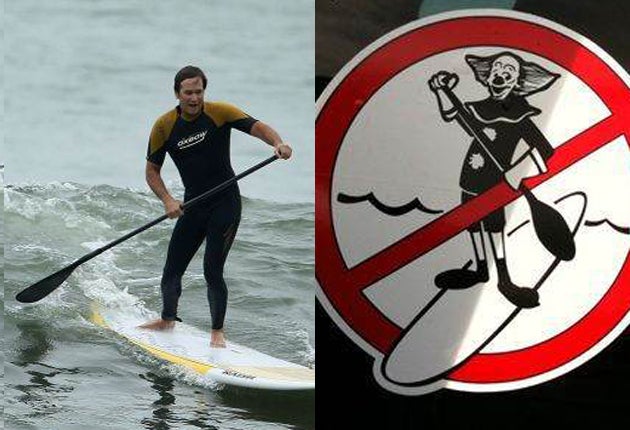Everybody's gone surfing (but the Hawaiian purists are upset )

Your support helps us to tell the story
From reproductive rights to climate change to Big Tech, The Independent is on the ground when the story is developing. Whether it's investigating the financials of Elon Musk's pro-Trump PAC or producing our latest documentary, 'The A Word', which shines a light on the American women fighting for reproductive rights, we know how important it is to parse out the facts from the messaging.
At such a critical moment in US history, we need reporters on the ground. Your donation allows us to keep sending journalists to speak to both sides of the story.
The Independent is trusted by Americans across the entire political spectrum. And unlike many other quality news outlets, we choose not to lock Americans out of our reporting and analysis with paywalls. We believe quality journalism should be available to everyone, paid for by those who can afford it.
Your support makes all the difference.The Beach Boys started it. Not the falsetto West Coast songsters of "Surfing USA", but the Hawaiian watermen who still act as board caddies and gurus to visiting mid-managers and their families in from Des Moines, trying out the forgiving waves of Waikiki for the first time. Back in the late 1950s they would paddle out to the break and tow the tourists into position. But they needed a way of getting out there with a camera and a cigarette too. So stand-up paddleboarding, or SUP, was born. The original beach boys would equip themselves with not just a long, wide board but a wooden paddle, and would then use it to steer around the break, into and out of the waves, remaining upright all or most of the time.
Now a new SUP craze is sweeping not just Hawaii but the rest of the US and beyond. Little athletic ability is required andalmost anyone – Jennifer Aniston and Cindy Crawford are among those who have been spotted trying – can do it. But not everybody is enamoured, and purists have dismissed the craze as "cheating."
Ironically, it was Dave Kalama, a professional big-wave surfer, and Laird Hamilton – star of the Hollywood surf movie Riding Giants – who were instrumental in the modern resurrection of the sport. There is fanciful talk that it used to be one of the ancient Hawaiian recreations, harking back to the era of the ali'i (or "kings", which is why Jack London, the American author who made surfing famous, used to refer to it as "the sport of kings").
Even surfing icons and big-wave kings like Gerry Lopez, nicknamed "Mr Pipeline" for his mastery of the terrifying Hawaiian North Shore waves, is a convert to what he calls a "mellower" mode. For anyone who has tried the classical form, one great advantage is that no leap of faith in your own ability is required to switch from prone to standing. What makes the paddleboard even more appealing is that it works with or without waves. "All you need is water," Lopez says.
But purists are leading a backlash. SUP practitioners have bigger, longer, boards and an extra tool; they can catch the wave sooner; and they hog the break, say the critics. The tensions have led to a summer of near conflict on the beaches as expert paddle boarders muscle in on the bigger surf and collisions or dangerous near-misses become more frequent. Parts of California have banned SUP and on Long Island (SUP has been designated the unofficial summer sport of The Hamptons) posters and bumper stickers have appeared with a red cross drawn through a cartoon image of a stand-up surfer in a clown outfit.
Bodo van der Leeden, Captain of Lifeguards on the North Shore of Oahu in Hawaii, says stand-up paddlers are responsible for most emergency call-outs. Now, with clashes between SUP-ers and surfers a daily hazard, the lifeguards have started to introduce segregation. "It's basic traffic control," Captain van der Leeden says.
Matt Warshaw, author of The Encyclopedia of Surfing and (forthcoming) The History of Surfing, says the backlash against the "lazy" form has little to do with the purity or otherwise of SUP riding and more to do with rivalry. "Every surfer is half-starved for waves. Which means they're frustrated, which means they're looking for somebody or something to blame. The SUP guys, literally and figuratively, stand out from the crowd, and are the easiest target."
Join our commenting forum
Join thought-provoking conversations, follow other Independent readers and see their replies
Comments